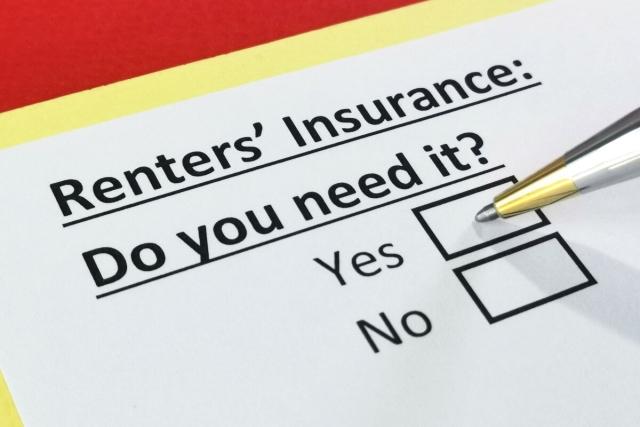Renters insurance isn’t always required to sign a lease. However, just because it’s not mandatory doesn’t mean it’s not important. In fact, some would say that renters insurance is vital for peace of mind and a stress-free tenancy. But is it really worth the cost?
If given the option, some renters forgo insurance to avoid paying additional recurring fees. But in the long run, these costs are well worth the mitigated risk and peace of mind. Plus, renters insurance is usually pretty affordable and easy to fit within a monthly or yearly budget.
In this article, we’ll shed light on what renters insurance entails, including its costs, coverage, and how it allows for stress-free renting. Here’s a look at our main discussion points:
- What is renters insurance?
- What does renters insurance cover?
- What does renters insurance not cover?
- How much does renters insurance cost?
- When is renters insurance worth it?
What Is Renters Insurance?
Renters insurance is a type of insurance coverage offered to renters. Whether you’re in an apartment, condo, townhouse, or single-family home, taking out a renters insurance policy is usually recommended. Regardless of what you own or how much it’s worth, having renters insurance coverage financially protects your belongings and finances from unforeseen losses.
Most landlords and property managers require renters insurance. This is not only to protect the renter’s belongings but also to reduce their liability in case of any mishaps or accidents that may occur on the property. However, if your landlord doesn’t require insurance coverage, it’s still something worth considering. Keep reading to learn more about what renters insurance covers and how it could benefit your renting journey.
What Does Renters Insurance Cover?
Renters insurance typically covers three main things: personal property, liability, and additional living expenses. Most plans will also include some optional add-ons and riders, but when it comes to standard coverage, here’s what you can expect:
Personal property
Personal property coverage protects basically everything you own inside your rental property. Whether it be clothing, furniture, or electronics, your belongings are safe from theft or damage with renters insurance. This protection can also extend to items outside of your home, depending on your policy. For example, if something is stolen from your car parked outside, your renters insurance can cover the costs for replacement.
Liability
Having liability coverage means you’re protected from costly mishaps or injuries occurring in your home or outside of it. Say your child is playing outside and damages your neighbor’s mailbox with a soccer ball. If your neighbor takes legal action over the incident, your liability insurance can cover the potential legal costs. This coverage also applies to incidents within your home’s four walls. For example, if a friend comes over and injures themselves in your home, your insurance could potentially cover their medical expenses.
Additional living expenses
Say a fire breaks out in your home and causes extensive damage. If this damage makes your home unhabitable, your renters insurance can fund your displacement. Whether it be a hotel, meals, or transportation, renters insurance covers additional living expenses to ensure you’re not paying out of pocket for these needs. This coverage typically lasts until your home is habitable again or until your policy’s limits have been exhausted.
Optional add-ons
Most insurance providers offer optional add-ons if you’d like to extend your coverage. If you’re a pet owner, for example, you’ll likely want to add pet liability insurance to your policy to protect yourself from pet-related mishaps or damage. Other add-ons you might consider are identity protection or scheduled personal property coverage, which offer even more protection for your well-being and belongings.
What Does Renters Insurance Not Cover?
While renters insurance protects you from many dangers, it’s not entirely foolproof. There are certain items or instances where your renters insurance won’t swoop in and save the day. That is, unless you don’t have specific add-ons that address specific needs, like natural disaster or high-value item coverage. Let’s take a look at some of these exclusions:
High-value items beyond coverage limits
Standard personal property coverage often falls short when it comes to insuring high-value items. Expensive jewelry, fine art, and collectibles, for instance, may not be fully covered if their value exceeds the policy's limit—typically between $1,000 and $2,000. To ensure these prized possessions are adequately protected, consider reaching out to your insurance provider to explore additional coverage options.
Flood and earthquake damage
Your renters' insurance policy clearly defines the situations it covers, typically including fire, theft, and vandalism. However, natural disasters like floods and earthquakes are often excluded from standard policies.
Your location plays a significant role in determining coverage for such events. In high-risk areas, policies may either include protection for natural disasters or offer it as an optional add-on. For instance, if you live in hurricane-prone Florida, adding this coverage is a smart choice. On the other hand, if you’re in a low-risk region, additional coverage may not be necessary.
Roommate’s belongings
Being a policyholder doesn’t necessarily mean your roommate is covered under your renters insurance. In most cases, your policy won’t protect your roommate’s belongings unless both of you are listed on it. However, joint policies aren’t always an option, as some states or insurance providers don’t allow them. If that’s the case, ensure both you and your roommate have individual coverage to stay protected.
Normal wear and tear
Personal liability coverage can protect you from property damage in certain situations, but it’s not a perfect safety net. Damage caused by normal wear and tear, negligence, misuse, or intentional acts won’t be covered, leaving you responsible for the repair costs. To avoid these expenses, it’s essential to maintain your home properly throughout your lease. Addressing issues promptly and taking care of the property can help prevent avoidable damage and costly repairs
Is Renters Insurance Affordable?
Now, onto the most pressing question: Is renters insurance affordable? The answer depends on your specific budget and financial circumstances. However, for most people, the answer is a resounding yes! Renters insurance is both affordable and a smart investment.
According to NerdWallet, the average cost of renters insurance in the US is $148 per year or $12 per month. To put that in perspective, that’s less than most Americans spend on coffee each month! While your specific rates will vary based on factors like location, coverage needs, and property type, it’s rare for a renters insurance policy to cost more than $30 per month. For such a small monthly expense, you gain significant financial protection and peace of mind.
When Is Renters Insurance Especially Worth It?
Renters insurance is a smart investment for all renters, but it becomes essential in certain circumstances. Depending on where you live, the type of property you rent, or your specific living situation, having coverage can make all the difference. To help you decide if renters insurance is right for you, here are a few scenarios where it’s absolutely invaluable:
Areas with high crime rates
Renters insurance is especially valuable if you live in a city with higher crime rates. In areas more prone to break-ins or vandalism, this added layer of protection can safeguard you from significant financial losses. However, it’s important to note that living in a high-crime area may result in higher policy rates.
Older buildings
If you rent an older building, chances are some of its systems, like electric and HVAC, may not be up to current standards. This can increase the risk of fire or electrical damage, making renters insurance even more important. In the event of a fire, your policy can cover the cost of replacing damaged belongings and finding temporary housing.
Roommate or pet situations
Even if your roommate is responsible, accidents can still happen. Say one of your roommates accidentally starts a kitchen fire. If they’re not covered through a renters insurance policy, it could end up costing the whole household significant amounts of money. Having renters insurance can protect you from these unexpected expenses and help maintain positive relationships with your roommates.
Pets can also create unexpected situations that warrant renters insurance coverage. For instance, if your dog accidentally damages a neighbor's property or someone is injured by your pet, you could be held liable for the expenses. Renters insurance can help cover liability costs, ensuring you're financially protected. Additionally, renters insurance may help cover damages caused by your pet within your rental, providing peace of mind for both you and your landlord.
Learn More About Renters Insurance on Apartments.com
Still have questions? You're in the right place! Apartments.com is here to help you navigate your options with confidence. Whether you’re moving into a new place or updating your current policy, our in-depth resources are designed to guide you every step of the way. Explore our comprehensive collection of articles to learn more about renters insurance and other essential topics for apartment living.
FAQs
Is renters insurance required by law?
Renters insurance is not typically required by law. However, some landlords may make it a requirement in your lease agreement to protect their property and ensure liability coverage.
How much does renters insurance usually cost?
Renters insurance is generally affordable, with average policies costing between $15 and $30 per month. The price depends on factors like coverage limits, your location, and the value of your belongings.
What exactly does renters insurance cover?
Renters insurance usually covers personal belongings, liability protection, and additional living expenses if you're temporarily displaced. It can protect against events like theft, fire, and certain types of water damage.
What is a renters insurance quote?
A renters insurance quote is an estimate of what your plan would cost for the coverage you picked.






